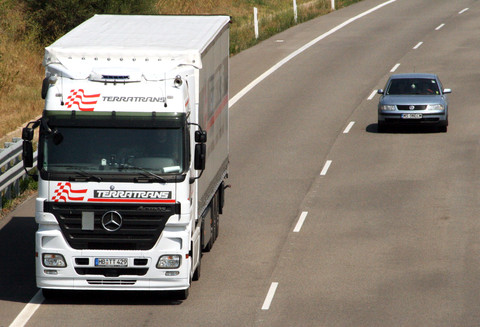[ad_1]

New border checks and travel restrictions introduced across Europe to fight new Covid-19 variants once again raise questions on how the EU Commission can keep the passport-free Schengen zone open.
Recent border restrictions imposed by Germany at its crossings with the Czech Republic and the Austrian province of Tyrol “are beginning to cause chaos to goods transport by road across Europe”, the International Road Transport Union (IRU), global road transport organisation warned on Monday.
On Tuesday (16 February), EU commissioners Ylva Johansson and Didier Reynders sent letters to all member states, reminding capitals of the framework agreed by the EU-27 on how to keep goods flowing and people free to move.
The issue will also be discussed at the EU affairs ministers next meeting, which is next Tuesday.
The road transport organisation argued that because truck drivers now have to present a negative Covid test at the Tyrol border of Germany, the ‘green lanes’ – an EU concept coined during the first wave of Covid infections last srping allowing trade to flow – are effectively closing.
The commission also raised concerns about the proportionality of Belgium’s ban on non-essential travel, for people wishing to leave the country.
Belgian prime minister Alexander De Croo’s government stressed last week that the ban, which is aimed at restricting travel during the carnival holidays, would be re-evaluated at the end of February.
Member states are allowed to reintroduce border checks in certain cases under EU law, in case of “threat to public policy or internal security”. However, measures should be temporary and the commission needs to be notified.
But steps taken are often introduced unilaterally and not thoroughly coordinated with other countries.
“We expect all member states to follow the coordinated approach,” a commissions spokesman said on Monday.
The EU executive added that both border closures or blanket travel bans should be avoided, and that member states should seek to avoid disruptions to supply chains, transport of goods and workers movement.
EU officials acknowledge that all member states are working on a careful balance between health concerns and keeping the EU single market open.
The commission’s recommendations on border restrictions due to Covid-19, even if member states adopted their updated version last October, are non-binding.
There is little the commission can do if member states decide to act on their own, or in a way that is harming free movement of people and goods disproportionally.
EU officials argue it would make little sense to start years-long infringement procedures to discipline member states when the pandemic situation changes fast, and countries are trying to adapt.
“We have to step back and think a bit. We want practical results and solutions quickly, but to what extent would infringements be the most effective tool that we have,” said an EU official, adding that the commission is in contact with national authorities.
Belgium, Germany, the Czech Republic, Austria, Hungary, Denmark, Finland, Spain and Norway (which is not part of the EU but is a Schengen-member) have introduced border measures due to the coronavirus.
Asked if border restrictions could spell the end of Schengen, an EU official argued that last June – at the end of the first wave of infections – member states went back to the normal functioning of the passport-free zone.
The expectation is that governments would do that again once Covid-19 is under control.
[ad_2]
Source link